5 Things You Should Never Say to the Child Who Struggles with Math
It can often be hard and frustrating trying to teach a child who struggles with math. No matter what you do or how you teach a concept, they just seem to fight to grasp the concepts. I know that in those moments it can be easy to lose patience, or join them in their frustrations, but in the long run, saying the following when they are frustrated or struggling will not help them. Here are some common things you should never say to the child who struggles with math (or even a child who is good at math!).
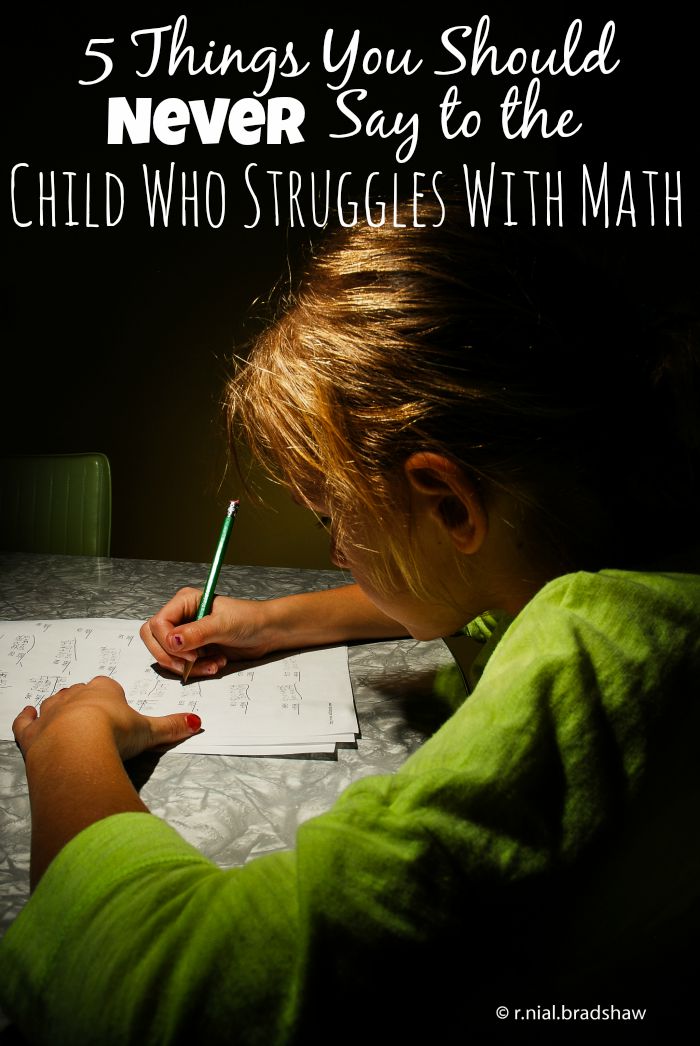
Photo Credit: r.nial.bradshaw via Compfight cc
*Please Note: Some of the links in this post are affiliate links and help support the work of this site. Read our full disclosure here.*
So here are 5 things you should avoid saying (and what to say or do instead):
- “Just do it and get it over with.”
I know (because I’ve been there) that there are times when it can feel exhausting to fight the “math battle” again. But it’s not going to be beneficial for them to just “do it and get it over with.” If they’re just working through some problems in order to check it off the list for the day, they’re not actually thinking about what they’re doing. And likely, they’re not actually trying to understand or solve them correctly, they’re just trying to get it over with.
For a child who doesn’t understand mathematical procedures and algorithms, just going through the motions of working out a problem is not going to lead to conceptual understanding. So maybe instead, spend the same amount of time on fewer problems, and try to talk through the why. Or take a break from the formal math altogether and play a math card game!
- “Don’t do it that way.”
Whether you homeschool or you’re helping your child with their homework, if you were taught to solve a problem a particular way, it can be very tempting to tell them to do it your way. The thing is, there is always more than one way to solve a math problem. And just because you might approach a problem differently, doesn’t mean your child thinks the same way or sees the question in the same way. Their approach may be completely valid, so don’t stifle them just because their thinking is different than your thinking.
This is especially true for the child who normally struggles in math. It will be so disheartening to them if they have figured out a problem, and feel like they understand it only to hear that they are “doing it the wrong way.”
Instead, take time to observe their thinking. Ask probing questions like, “Why did you do this or that?” or “Can you prove that solution?” to get them to explain. And they might just surprise you by solving it in a way that was easier and more logical!
And if they are attempting a method that you know will end in error? That’s ok too. Mistakes are part of the learning process and it can be helpful for them in the long run if you just let them make some mistakes.
- “Here’s the answer.”
Please don’t just hand your kids the answers. This is not going to help them learn or understand. If you are teaching your child to read, will they grow in their knowledge and expand their vocabulary if you tell them all the hard words? Will they recognize or figure out that hard word the next time they see it? I’m not a reading teacher, but I’m willing to bet that my son will not learn to read or grow in confidence if I just tell him the word every time he reads it wrong.
If your child is struggling, let them take a break. Encourage them to move on to a different question and come back to it later. It might be helpful to set a timer and tell them that it’s ok if they don’t figure it out, but they have to work on it for at least x number of minutes (the length of time will vary depending on the age of your child). Or maybe it’s just a sign that they need to be done for the day! And sometimes, that’s ok too.
I had a math professor in college who would tell us all the time that our brains are still working even when we’re sleeping, so sometimes it is better for us to go to bed and be fully rested than to stay up all night fighting with a problem or a proof. I took her up on that advice many times, and I always felt less frustrated with the problem in the morning, and sometimes had a new idea to try and solve it!
- “You’re too slow.”
Mathematics is about recognizing patterns, and learning to problem solve. It’s about modeling life in the world around us with equations and formulas, and using those models to solve important problems. It’s not about being the fastest at computations. If it was simply about fast computing, there would be no need to study math at all because a calculator or computer can do that for us.
I know that sometimes kids are easily distracted, or they’re procrastinating or simply not doing their work (that’s a whole other issue). But if they are genuinely working, and trying, but it just takes them a little longer? That’s ok. Rushing will often lead to careless mistakes. So let them take their time.
Again, if they are slow workers, maybe they just need fewer problems. Or maybe math will just take them a little longer than everyone else. Just plan accordingly and encourage them and praise them for persevering in their work, even though it takes them a while. (Or check out this post on ideas for using timed tests effectively!)
- “I hate math too, but…”
I can’t stress this enough. Your attitude will affect your kids. If you are anxious or frustrated with it, they will be too. Even if, in your heart of hearts you absolutely detest math and nothing I nor anyone else says can change your mind, please don’t say that to your kids.
Maybe today they struggle, and it seems like they will never ever get it, but tomorrow a light bulb goes off! Maybe they will grow up to be an inspiring engineer or physicist or doctor or research scientist who cures cancer. Don’t discourage them before they’ve even had a chance to try. After all, Einstein was at one point a struggling student, and even dropped out of school for a time.
So if your child is struggling and whining and hating math, simply smile and encourage them to press on anyway. Acknowledge that it is hard, and there will likely be mistakes along the way, but that there are great lessons to learn from hard work and perseverance.
And if you hate math? Check out this post for practical tips and encouragement for moms who hate math (but want to be a positive influence and help to their kids).
What do you think? Do you, or have you, said any of these things to your kids in the midst of their math angst?
Are there any other things you should never say to the child who struggles with math?
What are some other suggestions you have to help your kids have a more positive attitude, or to at least not be so discouraged by their math struggles?
Want more tips for helping your kids with math? Sign up for my FREE email newsletter and get my ebook, Strategies for Problem Solving: Equip Kids to Solve Math Problems with Confidence for FREE, as well as new posts, encouragement and math teaching resources straight to your inbox, every week!


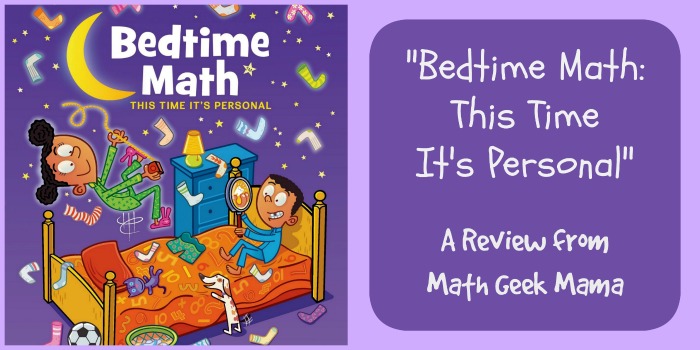

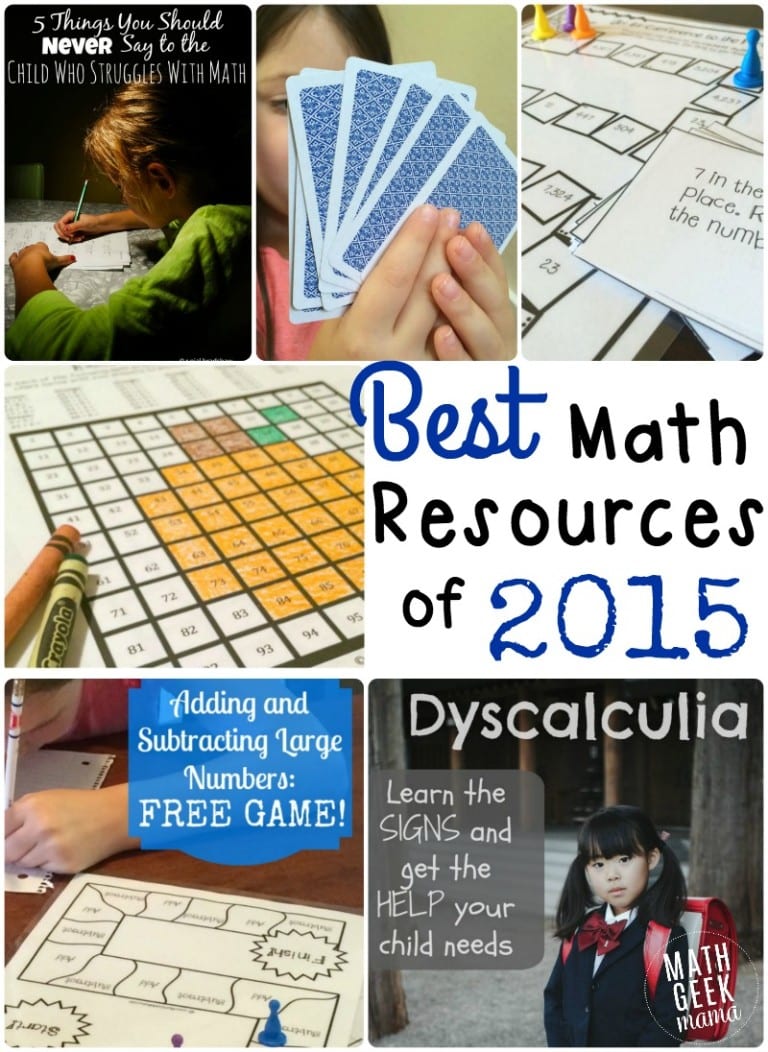
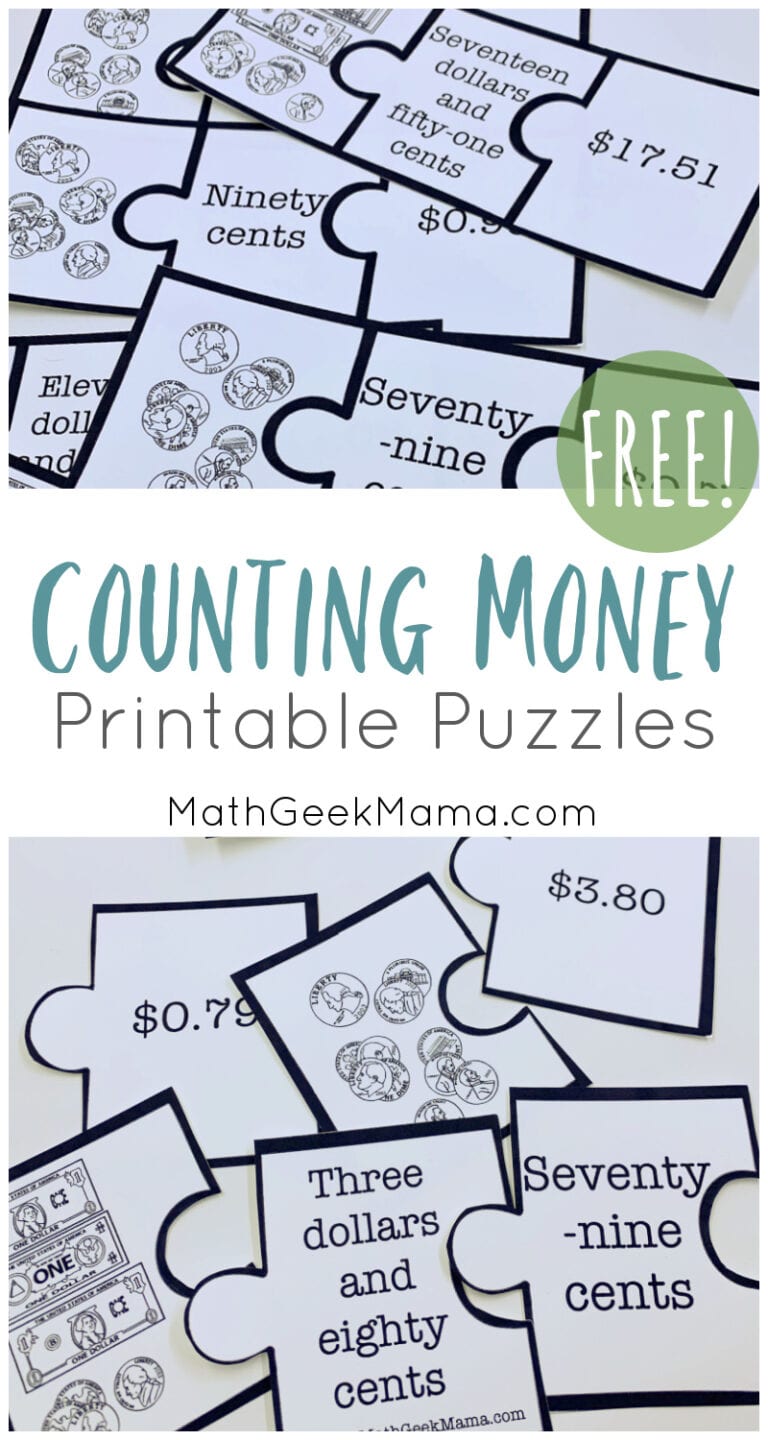
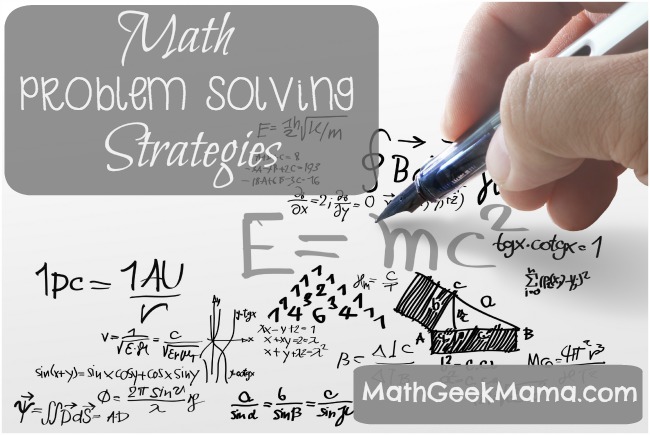
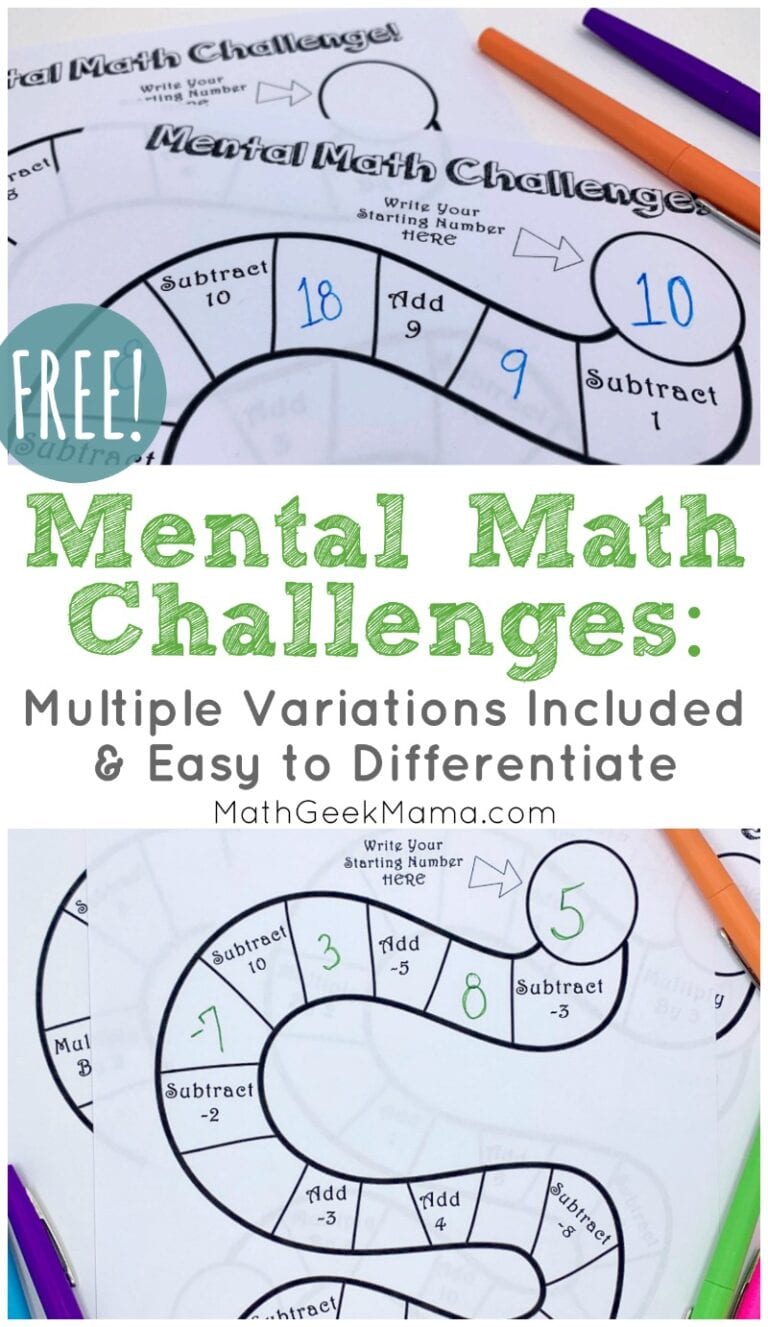

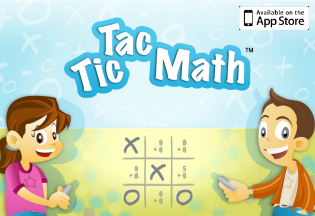


This is fantastic!!!
Thank you!
Excellent points! Our daughter struggles with math, especially mental computation, so we try really hard to give her real life (fun!) examples where she genuinely enjoys finding the answers in hopes that she will see how math applies to daily life and that it can also be ‘easy’ for her to do.
Thanks Jacquie! You always share great ideas for making math fun and interesting, and I’m sure your daughter greatly appreciates it (or will someday)!! 🙂
Great suggestions! We have the opposite situation in our house – I struggle with math but my daughter rocks at it! 🙂
Very good article, thanks for posting 🙂
I’m a teacher and one of my MAJOR pet hates, is at Parent Consultations, when parents say in front of their child, “I was never any good at Maths either….” AAAAaaaarrrgggghhhh!!!!
Like all off these, but I’d add: “it’s easy.” Takes away any accomplishment and heightens the cost of failure. Instead, I suggest, “this is hard, but I think you can do it.”
Yes, completely agree!! I always tell my students, “I know this is hard, but I also know that you can do it.” Getting them to actually believe that can be so hard though!
Great advice. We’re still only in the number learning stage, but I’m going to remember this when we start working on problems.
Great tips!! Thanks for linking up at the Thoughtful Spot Blog Hop! 🙂
These are great tips! Here is another thing not to say: “Don’t worry; this math is really easy!” It’s *not* easy to the child having difficulty, but if you say it is, they might start to wonder why they can’t do it? If you say, “Hey that’s hard; let’s figure this out” then, the challenge is acknowledged and you’ve offered to help (but not to do it for them or just give the answer :-).
Sometimes, though, it is not the child struggling with the *math*, it is the child struggling with *the way* math is taught, or assumptions about the way they are to learn math. Excellent teachers are sensitive to the wide variety of student needs and will differentiate instruction and create learning environments conducive to inquiry and higher level thinking. Also, skilled teachers will not kill math with endless hours of weekly homework drills where student repetitively solve meaningless problems. The best teachers always have as their goal that students think; the math they are doing should not just fall into the learning of a series of memorized steps to solve a problem.
Completely agree, Jim! It always made me cringe to hear other teachers say to students, “Come on, this is easy!” Thanks for taking the time to comment and share your thoughts! 🙂
I have been guilty of some of these especially 1 and 4. 🙁 Thankfully, I have learned to have a little bit more patience.
Oh yes, I’m still learning patience too! Thanks for stopping by!
Oh my, this is good! I struggle with telling my 8 year old how to do it…I really need to work on that. Thank you for the great tips! #MMBH
Thank you so much Erin! 🙂
I think it’s helpful to ask with story problems, “Well, what are you actually DOING here?” and try to have her visualize it. My daughter needed to figure out how much each item cost if a 4-pack was $5 (or something like that.) She didn’t know if she should divide 4 by 5 or 5 by 4 to get the answer, so we talked about what she was actually doing.
We drew a circle and said the circle represented $5. We drew lines to divide the circle into 4 parts representing the items purchased. Then I shaded one part of the circle and asked how we’d figure out how much that one part would cost. Once she saw on paper what she was actually trying to do, she knew what numbers to divide to get the answer. (The hardest part of math is not understanding what you’re actually doing, just doing operations without understanding why.)
#MMBH
based on my own experience, I’m inclined to think anyone who asserts “I HATE MATH”! is probably struggling with one of the variations of dyscalculia. For some, dyscalculia is like dyslexia – every time you look at the problem, the numbers look different: or it may be operational, the sequential process, or symbol recognition. In my case, I appear to have a gap in numerical definition, i.e. “3+5=8” doesn’t really mean any more to my brain than “ng+dok=ohm”. I did OK in the first levels when I could visualize objects (three apples plus five oranges equals eight pieces of fruit) but multiplication was a nightmare until I was in sixth grade and started assigning personalities to numbers- ones are everybody’s best friend, nothing ever changes with a one … two’s are your “bff”, double the fun … seven’s are EVIL because they don’t play by anybody else’s rules! (etc- some day I’m going to turn my number games into a learning book!) it was a creative process that helped me cope, but I still avoided numbers whenever possible until a few years ago when I finally read a description of mathematical disabilities and thought, that’s me! Now that I know it isn’t a matter of being ‘stupid’, not trying hard enough, or ‘doing it wrong’, I can handle numbers much more calmly.
Thanks for sharing your experience, Holly, and your creative way of coping! I love that you found ways to work through it rather than giving up, and I’m glad that you now understand the issue is Dyscalculia. This is an incredibly unknown and undiagnosed condition! You should definitely put your ideas into a book, I’m sure it would help a lot of people! 🙂
I can appreciate this post. My daughter struggled like no one’s business. At one point, I hired a math tutor who was, quite obviously, a math whiz. I couldn’t even keep up with his explanations (and I’m good at math!). He left my daughter in tears weekly. He finally decided, after two sessions, that she just didn’t want to learn.
Turned out she has dyscalculia.
My child was failing math so we decided to pull her out of traditional school and homeschool her. Little did I know how tough it would really be. Subscribing to your emails has been a life saver. This article really challenged me to be patient and keep my negative feelings about doing math together to myself. Thanks bunches!
I never tell a child it is “easy”. Because for them, at that moment they are stuck or frustrated a d it isn’t easy!
Yes, completely agree! Math gets hard for all of us at some point-some at subtraction, some at calculus!
First, I would like to say thank you for this post. You have some great reminders of what not to say to our children, not just regarding math, but in any task. However, I would disagree with the last one. Both of my kids have struggled with math.
Yet, one day, I sat with them and told them I did not like math. They were shocked because to them I seemed to enjoy it. I was honest with them about my struggle, about my dislike for math, but how I persevered, and as a college student I grew to like it.
I believe if we are honest with our children about our struggles, they will come to understand that struggles are a natural part of life. Furthermore, because they can see how I persevered and can now do math well, not that I am a mathematician, they to can get better if they persist. Also, they came to understand that we all have things in life that we do not like to do, but we still need to do them.
This has opened a line of communication between my children and I. One I am certain would not have been there had I not been honest. And, I am happy to say that they are more relaxed when it comes to concepts they do not understand. They now trust me to be patient and understanding of their struggles. 🙂
I completely agree! And thank you for bringing up a great point! I definitely think we can and should be honest about our struggles. What’s great about your conversation is that you were able to share how you persevered and overcame. It’s more about attitude I think. A poor attitude that says, “I hate math too. It’s terrible and you’re never going to like it or get better,” is very different from an honest discussion of your struggles and eventual triumphs. 🙂
Thank you for summarising everything I have been thinking for some years now. A really helpful read and just what I needed today 🙏